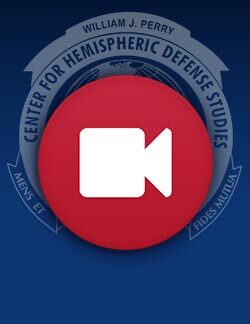Note: Admiral Francisco Soberón Sanz's comments on this recording were not interpreted from Spanish into English
Based on fieldwork in Colombia's regions, this study provides a history of the conflict, compares it to other case studies, examines the war from the perspectives of the government and the guerillas, delves into the development of special Colombian capabilities (notably in intelligence and the use of air power and special forces), and explains the economic dimension in terms both of historical exclusion and ongoing attempts at growth and inclusion. Finally, it concludes with an assessment of the country's prospects: can the combination of improved security, a flourishing economy and the peace process offer an opportunity to finally translate Colombia from, in Gabriel Garcia Marquez's words, "a great perhaps" into something more permanent?
Davis, Dickie, David Kilcullen, Greg Mills, and David Spencer. A Great Perhaps? London: Hurst & Company. 2015
Only available commercially
CONTACT INFORMATION
